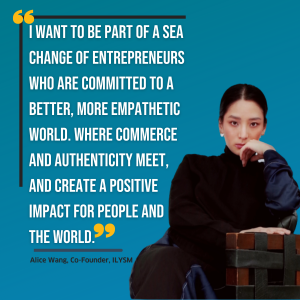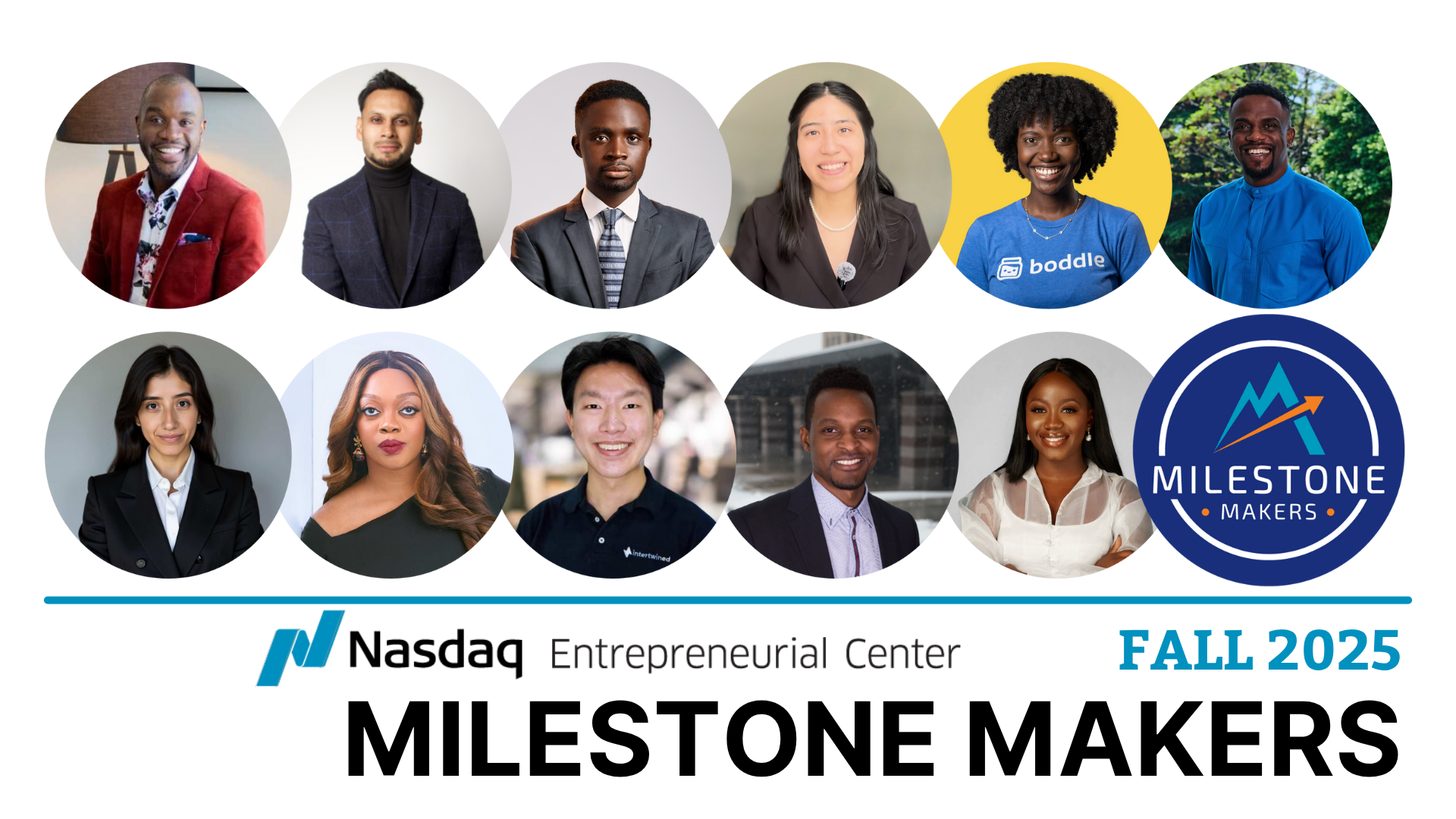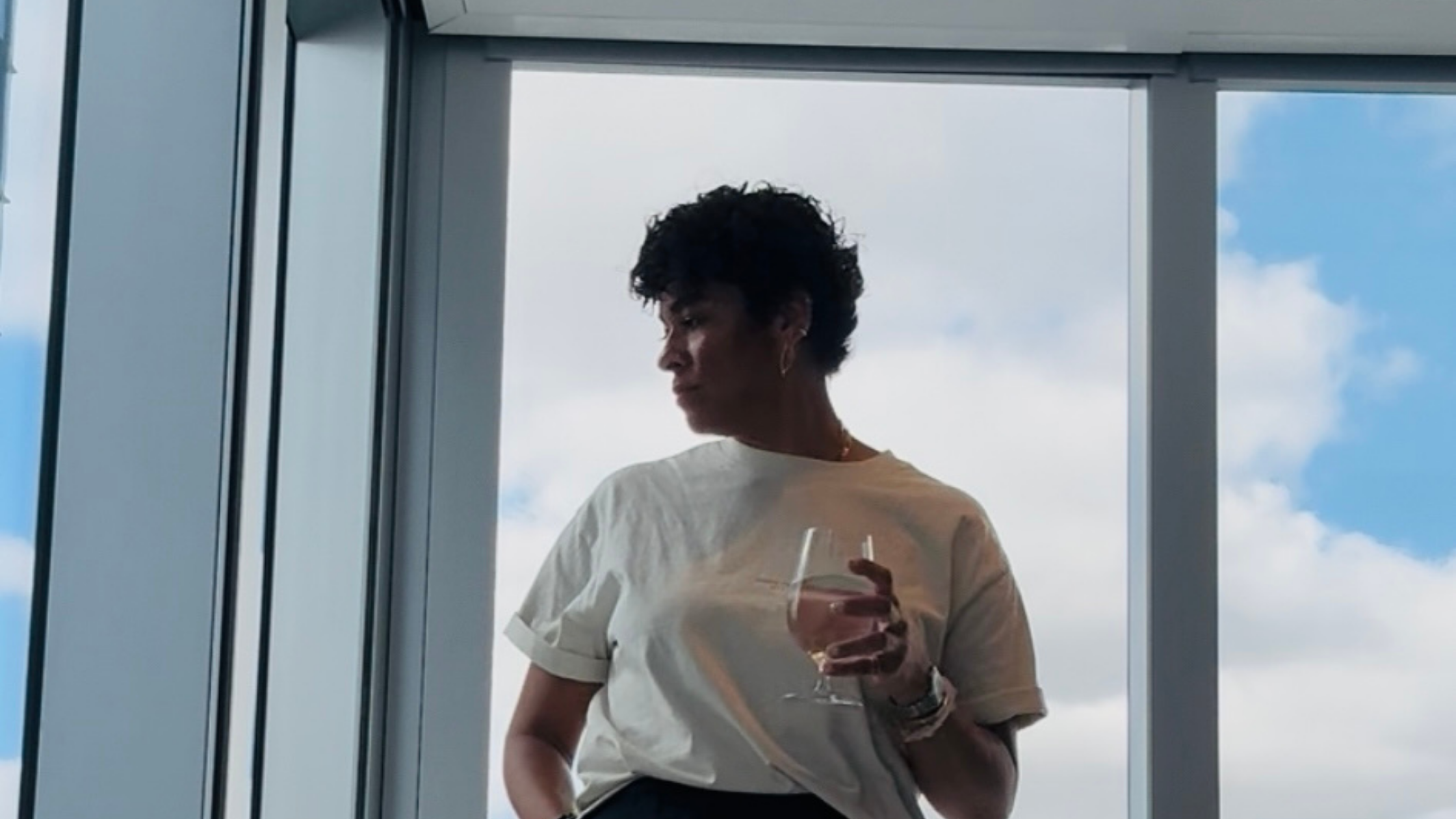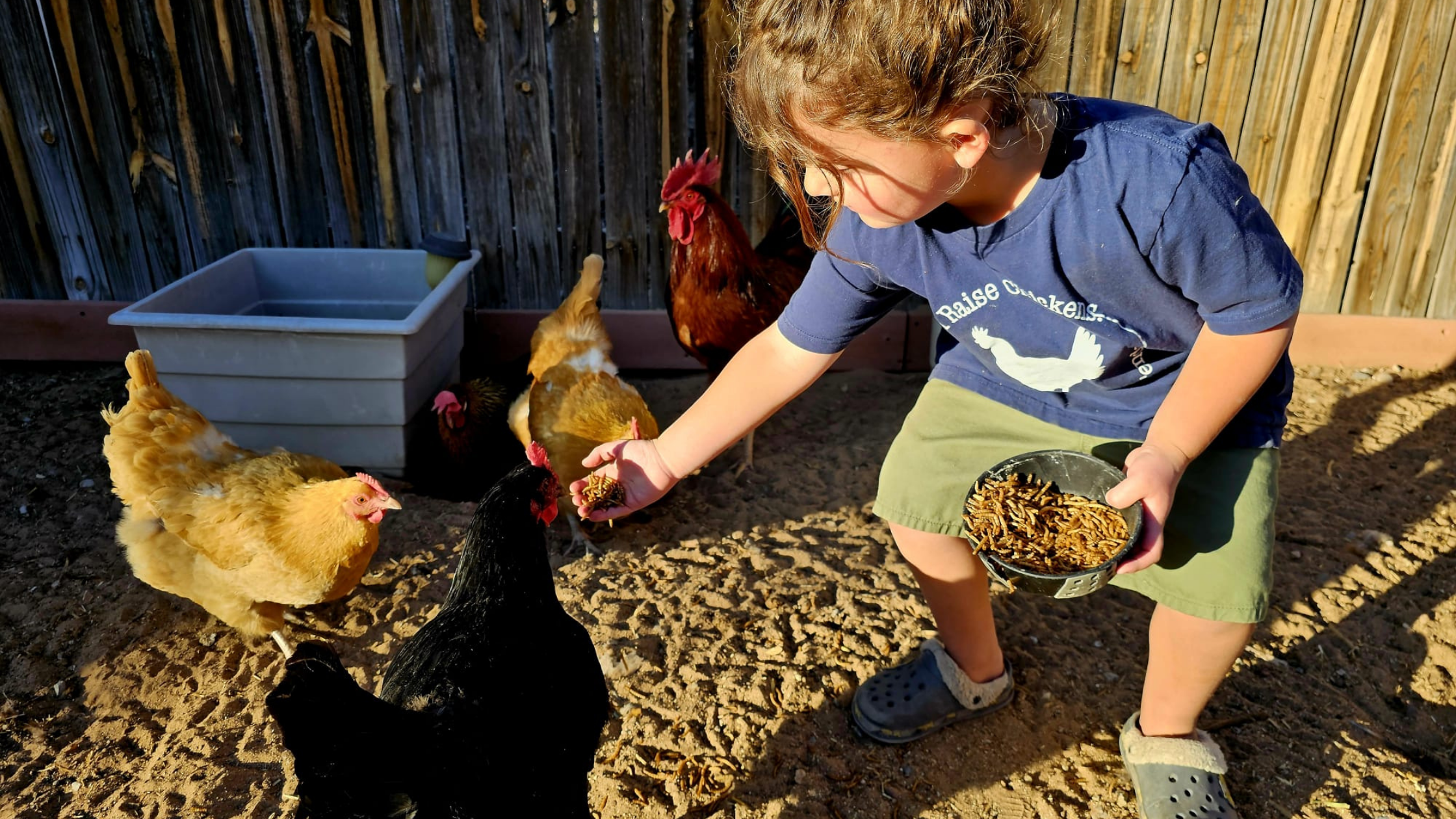Alice Wang is a fashion entrepreneur and co-founder of ILYSM. Together with co-founder Sara Jaramillo, a Yeezy alum, they recently launched their version of the tabi sneaker at ILYSM, which was created as a sneaker brand and digital community-driven platform whose mission is to support an ecosystem of artists and elevate new talent. They’ve taken a community-first approach; designing, manufacturing, and selling sneakers and beautifully made things while working to empower artists. Learn more about Alice Wang and her entrepreneurial journey below. (Portrait by Will Griffin)
What does “entrepreneurship” mean to you?
AW: In the past, entrepreneurship was exciting to me because it meant freedom, and the challenge of creating something from nothing. Now, it means something much more purposeful and weighted with responsibility. Entrepreneurship means that you are led by the change you want to see in the world, and by the needs of the community that supports your business. You have to believe that your vision for your change in the world SHOULD exist, even when others tell you otherwise (or worse, don’t even seem to care). But you also have to balance fighting to make your vision a reality with listening to your community and adjusting your vision to serve their needs and wants, not just your own.
 How did your company come to be?
How did your company come to be?
AW: I previously ran a small independent womenswear brand. I was struggling with advertising fatigue, social media fatigue. I was tired of aspirational imagery and messaging. I felt like even my interactions with brands that I admired were fraught with a tension between beautiful aesthetics and a feeling that the entire fashion industry was invested in creating incredible things, incredible imagery or spaces or moments, in order to stoke desire or admiration in you because there is something in you that is not enough.
And on the flip side, the accessible consumer brand side, there was so much messaging around how comfortable these shoes or garments were. I started thinking about comfort and what it meant to me, and moments when I felt complete sense of comfort, safety, and love. I thought back to childhood times, the game of sardines where you pack in a hiding place next to other kids, and you’re all snug in a small space, smushed up against one another, trying not to laugh too loudly. And how threatening and strange the world could seem sometimes, like a nightmare, and that feeling of sitting on your mom’s lap, putting your head on her chest and closing your eyes. And she wraps her arms around you, and you can hear her voice reverberating through her body, and you’re being held and it’s this womblike, safe place. And I thought, what if we tried to design an everyday shoe that might give you a tiny piece of that feeling? Like a little hug for your feet.
How has your business changed in response to the COVID-19 pandemic?
AW: The week the COVID-19 shutdowns hit NY, we saw our friends in nightlife, restaurants, hospitality, retail, lose their source of income overnight. And when you’re living month-to-month or week-to-week, that’s devastating. We decided to offer $500 #ILYSM4Artists grants weekly to artists in financial need due to COVID-19.
We reached out to established artists we admired to see who might come on as a guest judge to help us select the grant recipient. We were overwhelmed by the response from our community as well as from the guest judges like Ryan McGinley, Kimberly Drew, Jerome LaMaar, Aminé, Dustin Yellin, Marilyn Minter, Laurie Simmons and more. Our business changed as a result; the #ILYSM4Artists initiative we launched due to COVID-19 shutdowns brought us so much closer to our community and customers.
Now we’re doing #ILYSM4ArtistsCommissions where artists, makers, performers show us their work on IG, and we select an artist to feature each week and send them a free pair of tabis. At the end of each month, our community votes on an artist to receive a paid commission with us. We’re also developing a $99 art store featuring work of artists we discovered via #ILYSM4Artists. We’re focused on engaging, listening to, and serving our customers and community rather than establishment gatekeepers.
What is your proudest and darkest moment so far?
AW: It was a dark moment when we did a press push back in March on our newest vegan tabi sneakers, then saw that push overwhelmed by news of COVID-19 shutdowns and realized what that meant not just for our brand but for the world. We had just moved to a larger studio space to accommodate weekend open studio hours, where customers could try on and purchase tabis and shop with makers, artists, and small brands that we invited to pop up in the space free of charge and commission – we had planned the first one for slightly before the shutdowns hit. Our studio is just a very comfy fulfillment and warehousing space for now.
The proudest moment was when I realized that despite all of the challenges and changes we’ve had to adapt to over the past few months, our small but mighty team believes in our mission more than ever.
How is your company changing the landscape?
AW: We are working to transform the brand-customer experience. We hope to create a relationship with our customers that feeds us both and be a brand that accepts them and takes care of them rather than sells them an aspirational image highlighting a “problem” that they have or “void” that needs to be filled with a product. We think about sneaker design differently, in the ways we consider function, aesthetics, and comfort. Our designer, Sara Jaramillo, and I are both women, and even that perspective, that we’re not coming from a cis-male centric point of view seems to be a rarity in the sneaker world. We consider all of our potential wearers throughout the process, and continue to work to understand what practicing inclusivity really means!
What do you wish you knew when you started? Is there anything you would do differently?
AW: If I knew how deep our connection to community would be and how meaningful, I don’t think I would have initially defined success by the somewhat rigid goalposts and very conventional point of view of outward-defined achievement and success that I grew up with. What has been amazing to discover is the tremendous exchange and connection between ILYSM, our products, and our community. That’s something that’s blown our team away and inspired us to put everything we’ve got into fostering. It’s the most important thing to us — that our products and what we offer make a difference to people.
What advice/credo do you live by as you grow the business / what is your professional and personal mission statement?
AW: Be generous. Be kind. Remember why.
Where do you find inspiration when faced with challenges?
AW: In my collaborators, my team. It was my dream to work with people that inspire me and motivate me. I feel really lucky to have them, and they’re an incredible support system.
What does “success” look like for you? What do you think will help you achieve it?
AW: Success for me means having a team that is excited and motivated to go to work everyday, who feels like their work is meaningful and are generously compensated for their work. And customers that feel like they are a part of our team. We’re going to achieve this by listening and responding, by always working to create moments of happiness, inspiration, freedom for the people around us.
Has personal or professional “success” changed for you since the COVID-19 pandemic?
AW: I grew up with a very traditional achievement-based vision of success, and it’s hard to shift how you’re programmed, and what your family, who loves you, wants for you. I’ve found that working solely towards conventional goalposts rings hollow for me, especially if and when I get there and realize that nothing has really changed. I’m trying to learn to redefine how I set goals and measure success for myself so that they align with what really matters to me. The conditions of the COVID-19 pandemic have only made me more resolute in that: Do I have what I need, do the people that I love have what they need, and do we have a sense of purpose, direction and meaning?
What’s it like to work alone or with your partners? What advice do you have for fellow entrepreneurs about building and leading teams?
AW: I ran my previous brand alone, and it sucked. Do not recommend. Working with a team of brilliant, creative, inspiring people towards a common goal is what makes it all meaningful for me. My advice to fellow entrepreneurs who, like me, are building a team for the first time? Find a team that is passionate about achieving your vision for the company, who represent the values of your brand, who are excited to adapt to roles that are constantly changing and evolving as the business grows. They will become your family, your support system, but you also become theirs – so try and live up to that responsibility.
Many entrepreneurs continue to perfect their daily routines to support their work and greater vision; would you mind sharing your morning routine or a regular ritual that grounds your work each day? How has it changed in recent months?
AW: I go to therapy (virtually), and rely on a few elementary-school level vices; sour s’ghetti, pop tarts, and copious quantities of Hi Ball (caffeinated sparkling water. I’m addicted and I’m ok with it). I go on walks with our dog Potato, I look into her eyes and give her little shoulder massages and listen to her little doggie sighs, and I think that could be considered grounding!?
Pre-pandemic, one good thing that I did for myself was go to reformer pilates classes at New York Pilates, my friend Heather Andersen and Brion Isaac’s incredible pilates studio. I had never been a person that “worked out” before going to New York Pilates, but it makes me feel amazing in my body and when you’re going through challenging times at work and seeing very little progress, it is incredibly meaningful to find that you are able to do something you weren’t able to do yesterday, to feel a sense of incremental progress and accomplishment. I can still feel how proud I felt when I could touch my toes for the first time. Without having to physically travel to a studio and sit in a class with instructors and other students, I find it challenging to stop thinking about everything else that’s going on and focus on a workout for an hour. I found myself making a million excuses to skip working out. Now I’m trying for 25 minute workouts, hoping that a lower bar will make me feel too lame to procrastinate. It’s working so far!
What keeps you motivated during this time?
AW: I’m motivated by our team, our community and customers. It feels worthwhile when they tell us how much they loved our tabis, or the unboxing experience, or even when they take time to let us know ways in which we could do better – I’m grateful that they’re invested in wanting to see us be better. We just hired a new team member and when they told us that they had actually preordered a pair of our shoes months ago, and what the brand meant to them, I felt this incredible feeling, because we’re actually doing what we had set out to do!
What kind of an entrepreneur do you want to be known as, as in, what do you want your legacy to be?
AW: I want to be part of a sea change of entrepreneurs who are committed to a better, more empathetic world. Where commerce and authenticity meet, and create a positive impact for people and the world.
What is a quote or some words of wisdom that help get you through the tough days?
AW: REMEMBER WHY!!! If all else fails, eat some candy, watch some shows about serial killers, have disturbing murder-show related nightmares, attribute your general anxiety to fear of murdery scenarios, and wake up ready to start a new day.
Do you have someone you’d like to nominate to be profiled in our Faces of Entrepreneurship series? Please let us know by emailing media@thecenter.nasdaq.org.




